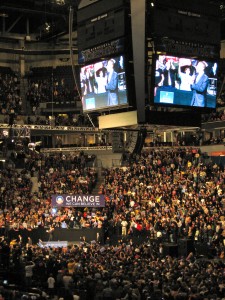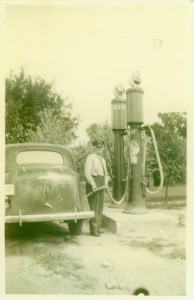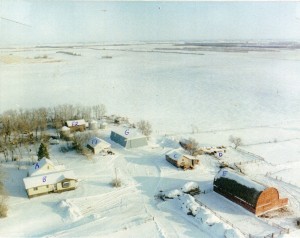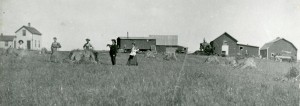Yesterday, President Obama had Speaker of the House John Boehner, Senator Mitch McConnell et al over for lunch. Everybody in that room knew what was going on, and what will continue. You don’t – you can’t – put aside six years of orchestrated hatred against the nations first black President, and “liberals”, and sincerely “make nice”. We the people apparently want a nation at war within itself, and we can expect two more years of being angry till the election of 2016, and regardless of who wins in 2016 we will see, daily, the difference between a positive philosophy of “win-win” versus the now dominant philosophy of “win-lose”.
We seem not to have voted for wholesome competition over ideas, thence compromise and rational decisions on civil law; we voted for civil war, amongst ourselves.
It seems a good time for me to review my own thoughts about our 44th President, Barack Obama.
I first “met” the future President at Minneapolis’ Target Center February 2, 2008. I stood in line for a long time along with a full house of others to see this new kid on the block. I was curious.
(click on photos to enlarge them)

Candidate Obama February 2, 2008, Minneapolis MN

Target Center Minneapolis February 2, 2008.
I took the above photos that day. My friend, Norm, would probably agree these are “thousand word” photos.
It happened that four days later, February 6, 2008, Minnesota held its Precinct Caucuses.
I always attend these caucuses. My wife and I went.
Twice, following those caucuses, I wrote about the experience the evening of February 6, 2008. For the curious, at the end of this post are the entirety of those comments, written to my own mailing list back then.
Succinctly,
“I cast my [straw poll] ballot [Feb. 6] for Hillary Clinton…[she] seems to have both the stamina and the backbone to endure the brutality of the campaign trail. This is some important evidence to me that she has what it takes to be chief executive of the United States, by far the most complex job on earth….”
Progressive friends were aghast at my choice: “how could you…?” It was an interesting on-line discussion for a few days. Only Obama deserved to win.
Ultimately, Hillary Clinton conceded the race; Barack Obama ran against John McCain, and the rest is history.
I wasn’t prepared for what happened next; though I made what turned out to be a prophetic statement the evening of February 6:
“Now comes the hard
part: keeping people interested, engaged and committed. This continued engagement can be a real problem. A lot of people showed
up last night solely to vote for Clinton or Obama, and immediately left….”
It was extraordinarily disappointing to see the vitriol heaped on Obama from the moment of his election in November, 2008, and continuing to this day. I expected some of it, though most was completely over the top and truly bizarre.
But that was not as disappointing as watching Obama’s “base” largely dissolve, mostly, it seemed, based on “we elected you, now it’s your problem to solve all of ours; to bring us “Change we can believe in”. But don’t expect us to show up and do any lifting, much less heavy lifting.”
I had come from a career arena where the daily menu was problems that needed to be solved, and I knew that even on petty matters, differences of opinion require patience and persistence. Too many progressives made impossible demands, immediately: close Guantanamo now; get single payer health insurance now; end war today…. Of course, on the Republican side, the active campaign from the beginning was to assure in every possible way that the new President would fail.
He actually accomplished a huge amount of good, against enormous obstacles. But, who cares?
Additional words from myself are superfluous.
Now we are preparing for the last two years of the Obama Presidency. He won’t be running again, we all know that.
As a nation, we seemed to have chosen a fork in the national road way back after September 11, 2001, and it was not a healthy choice.
I’m only a small fish in a very big pond, but to the extent I can, I’m going to continue to work for a more positive America in full relationship with the World.
This is our country. This is our world.
Comments:
from Flo H Nov. 8: Truly prophetic. I, too, voted for Hillary, but didn’t seek further nomination to higher levels of supporting my position.
from Bruce F Nov 8: Too much is being made of last Tuesday’s results. It was a small turnout, even by midterm standards. The Republicans were playing on their home field. The number of Senate seats needed to be defended by the Democrats was a huge impediment for them. The next election will be on the Democrats home field, and the math looks worse for the GOP than the Democrats just experienced.
Neither side presented a cogent message that resonated. The people are not happy. With the unemployment numbers showing job growth and the GDP numbers showing economic growth, the people don’t feel it and think the recovery has pass over them.
That is a recipe for a populist message. It can be a right wing populist message or a left wing message. The message that best captures the fear & anxiety of the voters will be powerful. It can be a Teaparty message or a populist left message like Warren’s.
In the meantime, it won’t be pretty in Washington. The Republicans can’t do anything that the president won’t let them do. Even if the do away with the filibuster, which they will and I hope they do, they can’t override a veto.
As far as working together, the KeystonePL is central. The Republicans really want it, while Obama want’s comprehensive immigration reform and improvements in ACA. So, look for Keystone to get the go ahead and
environment protection regulations weakened for immigration reform an improved ACA.
from Lydia H Nov 9: You are certainly right that too many (mostly non-activist) people thought all they had to do was vote for Obama & he;d solve everything. No activist I know ever thought that. So, here were are 6 years later w/more war, Wall Street still sucking up wealth & evading prison, & our environment in more peril than ever. The ACA is giving some people access to health care (no small thing—my best friend had a cancer scare last spring & if not been connected to the MNSure I do’t even want to think about how it would have turned out. He got early early diagnosis & surgery & it’s looking very good for him). But the ACA isn’t lowering costs of health care. No matter what they say, insurance/Big Pharma are doing quite well.
Unemployment has gone down although wages remain as stagnant as ever.
Problem is way too many people think ALL they have to do is punch a button marked D or R every 2 or 4 years & that’s it. But, REAL democracy requires far more of us.
Thanks for continuing to remind us of that reality
On to 2016.
Dick Bernard
Heres’ what I said, way back when:
Dick Bernard in P&J #1566 February 6, 2008:
CAUCUSING:
I’ve attended precinct caucuses for years. Our particular caucus
location for the last several years has been a junior high school a 15
minute drive from me, just off I-94.
That’s 15 minutes on a normal day.
Tonight it took almost an hour to drive to the location, most of that
time spent in the last half mile jammed bumper to bumper on the freeway
and the exit ramp, and then another 15 minutes to walk to the school from
my car which I had to park on the shoulder of the road.
The time spent had everything to do with the precinct caucus
attendance, which was HUGE.
My caucus location was teeming with young people. The young guy who
serves me coffee most mornings at my local Caribou was there, volunteering
for Al Franken. It is nice to make occasional unexpected connections like
these.
I cast my ballot – for Hillary Clinton; registered to become a
delegate to the next level – an important step, as the next level is where
the state delegates are selected. We left early as Cathy needed to get
home for some phone calls. It was a long chilly walk back to the car,
then home.
Why my vote for Hillary? More on that in a later post.
(The presidential vote in Minnesota last night is simply a straw poll
of those who actually registered at the caucus. It reflects who showed
up. Nonetheless, it will be interesting to see the results.)
I got a sense, last night, that people in my area are wanting their
country back. This was a school full of serious looking people. I’ll
hope their commitment sustains itself, and in fact grows.
For myself, I’ll be proud to support whoever ends up as the nominees.
More on my impressions at the end of this post…
*
Some final thoughts from Dick: a friend stopped by at coffee shop this
morning, and said that 2100 were at our caucus location, compared with 700
two years ago. Vote was probably 2-1 for Obama at our location, even
heavier in his affluent part of town. Chatting nearby were an older guy
and a younger woman, both of whom I know a little, both apparently
actively Republican. They were deeply involved in fearing the evils of
socialized medicine and Hillary Clinton. So goes the debate.
As candidates so well know, there are two ‘peaks’ to attain: first, the
nomination of their party; second, the election by the people, hopefully
somewhat fairly through the process of ballots. For eons, organizers have
come to know a basic truth about campaigns: don’t peak too soon! If your
campaign reaches its high point six months out, you’ll lose as certainly
as if it peaks six months after the election. The careful strategists are
well aware of this dilemma. The Obama campaign is well aware of this
dilemma as well. Super Tuesday (a media creation more than a substantive
national primary) makes necessary aggressive and expensive campaigning by
all the candidates. But it is just a media creation. Now comes the hard
part: keeping people interested, engaged and committed.
This continued engagement can be a real problem. A lot of people showed
up last night solely to vote for Clinton or Obama, and immediately left.
A heap of us will gather (in my case) March 8, for a long, long, often
very boring day at our Senate District Convention where the hard process
of selecting delegates to the state convention begins. In turn, the state
convention will select the national delegates, and on the process goes.
We will work really hard on March 8, and listen to lots of people, and try
to make some kind of reasoned and reasonable decisions. The people who
came, voted and left, will have no appreciation of this part of the
process.
Hang in there.
Here’s the rest of the Presidents, with their age at time of election.
George Washington, 56; John Adams, 61; Thomas Jefferson, 57; James
Madison, 57; James Monroe, 58; John Quincy Adams, 57; Andrew Jackson, 51;
Martin Van Buren, 54; William Henry Harrison, 67 (MY AGE, but he lived
only 31 days in office – bad omen. Keep my day job); John Tyler, 50:
James Knox Polk, 49; Zachary Taylor, 64; Millard Fillmore, 50; Franklin
Pierce, 48; James Buchanan, 65; Abe Lincoln, 51; Andrew Johnson, 57; U.S.
Grant, 46; Rutherford B. Hayes, 54; James Garfield, 49; Chester A. Arthur,
52; Grover Cleveland, 47; Benjamin Harrison, 55; William McKinley, 53.
P&J 1568 February 8, 2008
Why I voted for Hillary:
This is one of mine I hope you’ll take a moment to read.
Pro or Con responses will go into a future mailbag. (There will be a ‘mailbag’ following this one, then I may give you a break for the weekend!)
Why did I vote for Hillary, and Why am I inclined to support her?
There are no simple answers to those questions, whether answered by me, or anyone else. It is a complex matter. But I can provide some clues, with some data I find significant:
1. No less an authority than archconservative William (Bill) Bennett pronounced on CNN yesterday afternoon (Feb 7), that while he had serious reservations about John McCain as the Republican nominee, he would back him because McCain had an American Conservative Union rating of 82, while Hillary Clinton had a rating of 9. (If those numbers are incorrect, it’s Bill Bennett or American Conservative Union who’s lying, not me!
Here is where you can check. On this list, which ranks lawmakers performance through 2006, MN Senator Mark Dayton had a ranking of 11, and Norm Coleman a rating of 75. Obama’s ranking is 8. Most conservative: DeMint (SC) 98; most awfully liberal, Ted Kennedy of MA, 2).
2. The same afternoon of Feb 7, a letter came from a good friend, a Catholic Priest friend who’s now in El Paso TX saying he’s now “on board w/the Obama campaign. Clinton has never repented for her support of the [Iraq] war….” He was talking, I suppose, about the October, 2002, resolution on which she voted ‘aye’; and on which my own Senator, Paul Wellstone, wavered until almost the last second before voting ‘nay’ (I know the circumstances on the latter, since I was on the way to banner at Wellstone’s office that fateful October afternoon and on arrival there found nobody bannering. I learned after I got home that he had declared he would vote against the resolution. At the time, I was very new to the Peace movement, and nobody was keeping me in the loop about what was happening (they still don’t, too often!). Of course, that vote was strategized by the administration and Republican leadership to take place in very close proximity to the 2002 mid-term elections. It’s easy research to find out what happened that Nov.)
Clinton was in her second year in the U.S. Senate when that vote occurred, and representing her state of New York. Her vote apparently didn’t hurt her standing with her home state folks – her constituents…she was easily reelected in 2006.
If folks take time to recall, Bush’s approval ratings were still stratospheric then, and they were stratospheric because of his WAR rhetoric and planning, and the politically massaged aftermath of 9-11. It’s useful to think back to those times. Hillary Clinton’s constituency was and is in New York City and State, where the worst of 9-11 happened, and it’s hard to imagine any other vote from her at that time, however ill advised one might think it was in hindsight. I wouldn’t expect her to ‘repent’, either. (When I became a peacenik, October 2001 and the bombing of Afghanistan, 94% of Americans approved of the bombing. Talk about being in the minority.)
3. I have mentioned more than once that in my own assessment of the candidates stated positions, Kucinich clearly was most in synch with my own personal views (40), while Edwards, Clinton and Obama were quite positive and a virtual tie (29, 28, 28), with Huckabee and McCain almost tied far down the list (12, 11), and Romney almost a no-show (4). (In my listing, Mike Gravel came in at 29 also. Thompson, Hunter, Guiliani and Tancredo were at the end, with 3,2,2 and 1 respectively. [Link provided here no longer exists in 2014].
This assessment had lots of issues, and lots of position statements from all the candidates, not labeled by candidates, so I don’t know in which areas I was most in synch with Clinton or any candidate, but it was useful for me in trying to figure out the general positions of the potential candidates for the most complex and difficult job in the world.
**
Debate rages on this network and others about Clinton, and mostly it has been pretty negative towards her. It was an act almost like ‘coming out’ to mention that I was going to vote for Hillary on Tuesday! “What will they say?” I suspect I was/am not at all alone in the big camp of folks who think Hillary is okay, and her own person, too.
I haven’t and won’t rate Hillary based on her years as first lady; nor did I rate her based on Bill, though I admit to being puzzled why even Bill has been made out to be such a liability. Best as I recall, he was very popular with the American people even after the impeachment, and through the end of his term, and most people would take the ‘Bill days’ of the 90s in a minute over what we’ve endured in the last 7 years.
Clinton ended his term, as I recall, with still very high approval ratings. He still is popular here, and around the world.
But the notion has been planted (and accepted) that, somehow, that this is a bad couple, in almost any way someone wants to define ‘bad’, and this includes many assessments from the Left. So be it. Could the description be a ‘spun’ one? Are we witnessing how the Politics of Division and Character Assassination works, directly and/or subtlely? From BOTH poles of the ideological spectrum?
Hillary Clinton seems to have both the stamina and the backbone to endure the brutality of the campaign trail. This is some important evidence to me that she has what it takes to be chief executive of the United States, by far the most complex job on earth (if one takes time to be engaged in the complexity – Bush didn’t. “The Decider” decided and in the process we have become a country governed by a ruler not a President.) Even as first lady, Hillary was molded by and initiated into the vicious crucible of Washington politics with the Health Care reform dilemma early in Bill’s first term. She’s criticized for not achieving the goal; I rarely hear she (and Bill) complimented for trying….
Add to the complexity of governing a monstrosity like our democracy is, the almost certain extraordinarily difficult situations and circumstances that we are entering after this disastrous eight years, and I puzzle as to why Hillary or anyone for that matter would want to be President. FDR may prove to have had a cakewalk in comparison.
That Hillary Clinton is a woman has never caused me to wonder about her ability to lead. My career representing teachers (still basically a female profession), long ago rid me of the business of sex role stereotyping, if indeed, that ever was a serious issue for me.
As I prepare to click ‘send’ on this, I have one last thought, from overnight. Hillary (and the others) are cursed by the ‘Liberal’ label as if it is the mark of Satan himself. This has been one of the most successful anti-marketing campaigns in our history. I commented on ‘liberal’ at a disenchanted conservative’s dinner table a while back thusly: “I’m definitely a Liberal, but if you truly want Conservative government, where people carefully handle your money, and are Compassionate in the process, you’ll elect Liberal every time. We’re careful with our fellow citizens money.” Liberals in my experience are, by and large, careful with the dollar (sometimes ‘cheap’) because they’ve had to be; and they tend to be, I think, more truly compassionate and understanding of other points of view. There could be worse qualities. The best ‘Compassionate Conservatives’ are, really, Liberals. (I know plenty of truly Compassionate Conservative Republicans…these folks are, by their own admission, out of power even in their own party, and trying to figure out how to regain some of the deserved stature and respect they had in the past.
We’ll see what happens these next months. Keep talking.





